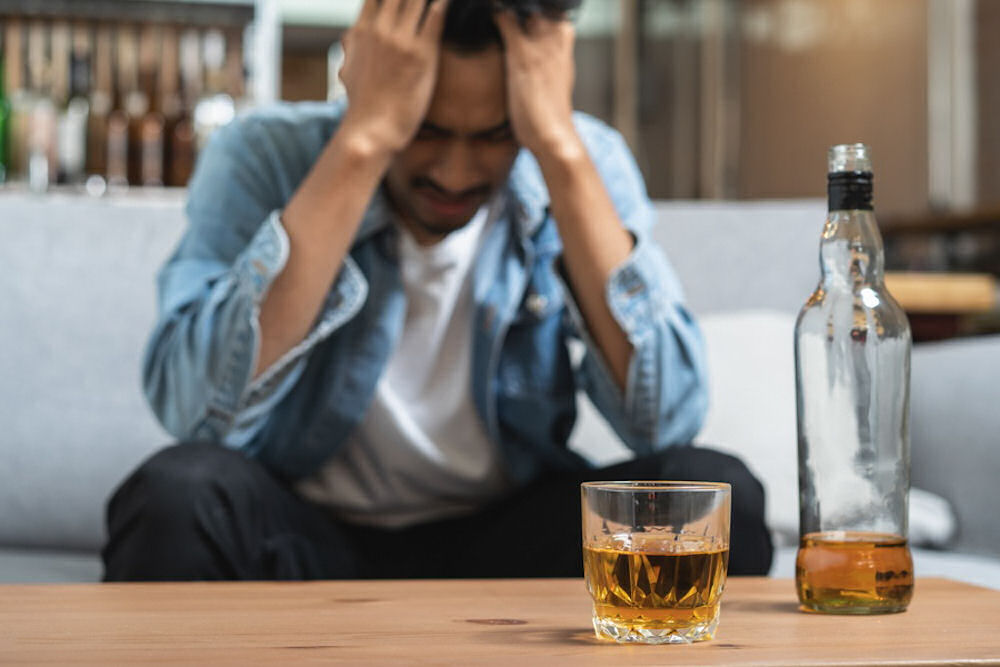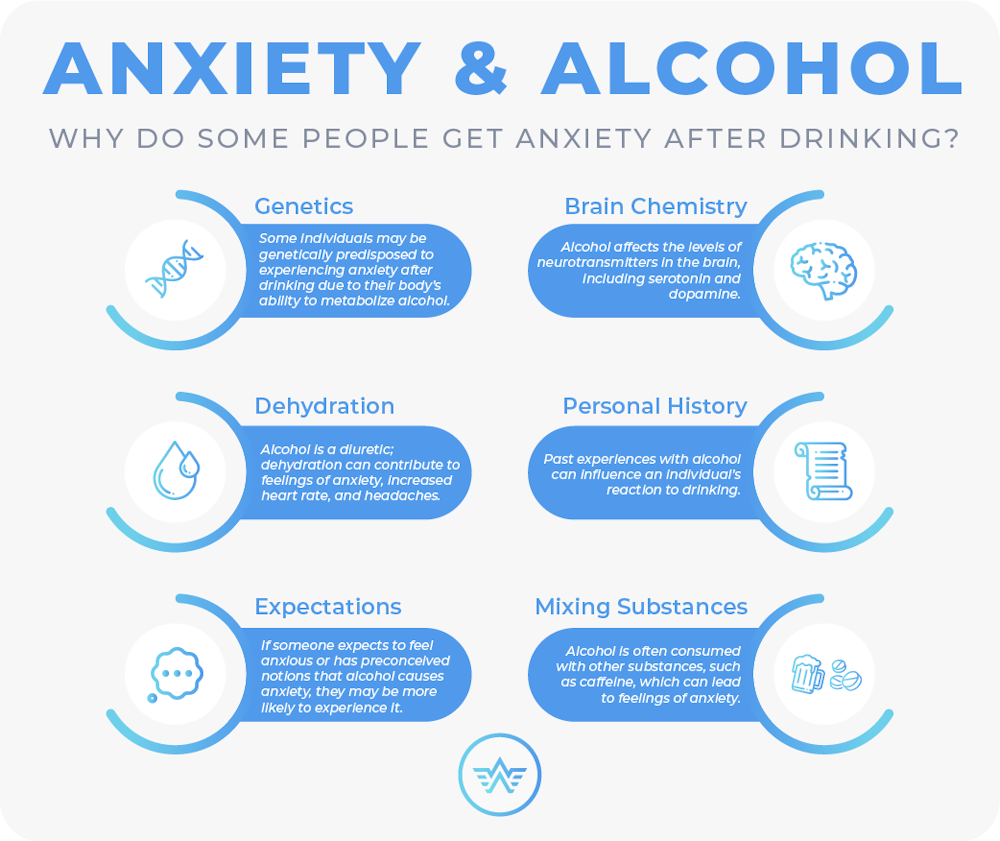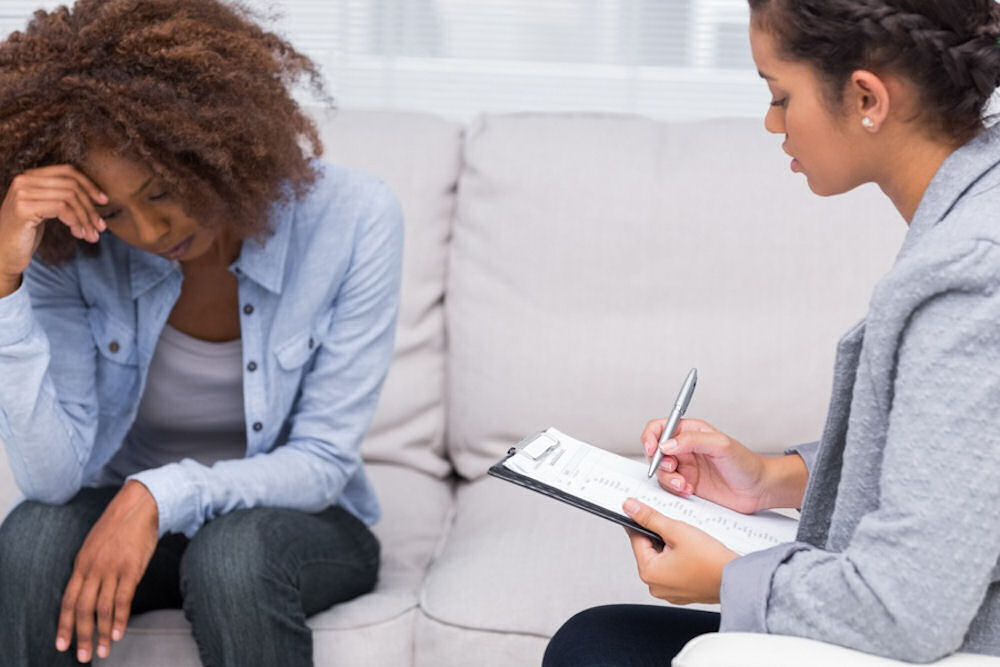People experience anxiety after drinking because alcohol is a central nervous system depressant, meaning it slows down brain activity and can alter mood. While some people may feel relaxed and less inhibited after having a few drinks, others may experience increased anxiety or even panic attacks.
There are several factors that contribute to this phenomenon:
- Genetics: Some individuals may be genetically predisposed to experiencing anxiety after drinking due to their body’s ability to metabolize alcohol. A family history of anxiety or other mental health disorders can also influence this.
- Brain chemistry: Alcohol affects the levels of neurotransmitters in the brain, including serotonin and dopamine, which play a role in mood regulation. Changes in these chemicals can lead to increased anxiety.
- Dehydration: Alcohol is a diuretic, meaning it causes the body to lose water and become dehydrated. Dehydration can contribute to feelings of anxiety, as well as physical symptoms such as headaches and increased heart rate.
- Personal history: Past experiences with alcohol, such as negative or traumatic events, can influence an individual’s reaction to drinking. If someone has had a previous experience where they felt anxious after drinking, they may be more likely to experience it again.
- Expectations: People’s expectations and beliefs about the effects of alcohol can also play a role in how they feel after drinking. If someone anticipates feeling anxious or has preconceived notions that alcohol causes anxiety, they may be more likely to experience it.
- Mixing substances: Alcohol is often consumed alongside other substances, such as caffeine or energy drinks, which can increase feelings of anxiety. Additionally, individuals who are taking certain medications may experience increased side effects when combined with alcohol.
- Underlying mental health conditions: It’s common for individuals with anxiety disorders to turn to alcohol as a means of self-medication. However, while alcohol may temporarily alleviate symptoms, it can ultimately worsen anxiety in the long term.
It’s important to note that experiencing anxiety after drinking is not the same as having an anxiety disorder. However, if this is a frequent occurrence or begins to interfere with daily life, it may be a sign of a deeper issue, and seeking professional help is recommended.
How Can You Manage or Prevent Anxiety After Drinking?
To manage or prevent anxiety after drinking, individuals can try setting limits on their alcohol intake, staying hydrated, and avoiding mixing substances. Engaging in activities that promote relaxation, such as deep breathing or mindfulness exercises, can also be helpful. It’s also crucial to address any underlying mental health concerns and seek treatment if necessary. Remember, it’s always okay to say no to alcohol and prioritize your mental well-being.
Overall, while alcohol may temporarily numb feelings of anxiety, it can ultimately contribute to a vicious cycle of worsening symptoms. Understanding the various factors that play a role in this experience can help individuals make informed decisions about their alcohol consumption and prioritize self-care. So, moderation is the key when it comes to drinking alcohol, and being mindful of its effects on mental health is crucial for overall well-being. Instead of using alcohol as a way to cope with anxiety, seeking healthier coping mechanisms and addressing any underlying mental health concerns can lead to more sustainable relief. It’s important to prioritize self-care and make choices supporting physical and mental health.
Overall, it’s essential to remember that everyone experiences anxiety differently, and what may trigger anxiety for one person may not affect another. If you or someone you know is struggling with anxiety after drinking, reach out for support and explore healthy ways to manage it. With proper care and awareness, it is possible to break the cycle of anxiety and alcohol consumption and prioritize overall well-being. No matter what your relationship with alcohol may be, always remember to take care of yourself and listen to your body’s needs.
What is Anxiety?
 Anxiety is a normal and often necessary emotion that humans experience in response to stress or perceived danger. It serves as a protective mechanism, alerting us to potential threats and preparing the body for action. However, when anxiety becomes excessive and interferes with daily life, it can be classified as an anxiety disorder.
Anxiety is a normal and often necessary emotion that humans experience in response to stress or perceived danger. It serves as a protective mechanism, alerting us to potential threats and preparing the body for action. However, when anxiety becomes excessive and interferes with daily life, it can be classified as an anxiety disorder.
There are several different types of anxiety disorders, including generalized anxiety disorder, panic disorder, social anxiety disorder, and specific phobias. Each type is characterized by specific symptoms and triggers, but they all involve excessive and persistent feelings of fear, worry, and apprehension.
Some common symptoms of anxiety include:
- Excessive worrying or feeling on edge
- Restlessness or difficulty sitting still
- Difficulty concentrating
- Physical symptoms such as muscle tension, headaches, and stomach aches
- Irrational fears or avoidance of certain situations
- Panic attacks (sudden feelings of intense fear or discomfort)
Anxiety disorders can be caused by a combination of genetic, environmental, and psychological factors. It’s essential to seek professional help if these symptoms are interfering with daily life and causing distress.
What is Hangxiety?
Hangxiety, also known as “hangover anxiety,” is the experience of heightened anxiety or nervousness after drinking alcohol. It can occur the morning after a night of drinking or even several days after consuming alcohol.
While it’s common to feel some level of discomfort after a night of heavy drinking, hangxiety goes beyond just feeling physically unwell. People who experience hangxiety may also have intense feelings of guilt, regret, or worry about their behavior while under the influence. They may also feel more socially anxious and self-conscious.
What are the Physiological Causes of Hangxiety?
 The physiological causes of hangxiety are not fully understood, but there are several factors that may contribute to its occurrence:
The physiological causes of hangxiety are not fully understood, but there are several factors that may contribute to its occurrence:
Alcohol is a diuretic, meaning it causes the body to produce more urine and can lead to dehydration. Dehydration can cause symptoms such as dizziness, fatigue, and difficulty concentrating – all of which can contribute to feelings of anxiety.
As alcohol is a depressant, the body may experience a rebound effect once it wears off. This can lead to increased feelings of anxiety and irritability.
Alcohol affects the levels of neurotransmitters (chemical messengers) in the brain, including serotonin and GABA, which play a role in regulating mood. Changes in these neurotransmitters can contribute to increased anxiety.
What are the Psychological Causes of Hangxiety?
In addition to physiological factors, there are also psychological causes of hangxiety. These may include:
Many individuals with anxiety disorders turn to alcohol as a means of self-medication. However, while it may provide temporary relief, it can ultimately worsen symptoms in the long run.
Alcohol can lower inhibitions and lead to impaired judgment, which can contribute to feelings of guilt or shame the next day. These negative self-perceptions can trigger or worsen anxiety.
For individuals with social anxiety disorder, drinking alcohol in social situations may temporarily reduce feelings of anxiety. However, once the effects wear off, they may experience an increase in social anxiety as well as regret or worry about their behavior while drinking.
Coping with Hangxiety
If you experience hangxiety, there are several strategies that may help you cope:
Make sure to drink plenty of water while consuming alcohol and after to combat dehydration.
Moderation is key when it comes to drinking alcohol. Set limits for yourself and stick to them.
Engage in activities that promote relaxation and well-being, such as exercise, meditation, or spending time outdoors.
Instead of turning to alcohol to cope with anxiety, seek out healthier alternatives such as talking to a therapist or engaging in a creative outlet.
If you struggle with anxiety even when you haven’t been drinking, it’s essential to seek professional help and address any underlying mental health issues.
Adler Health Offers a Dual Diagnosis Program in Orange County, California
 At Adler Health, we recognize the complex relationship between mental health and substance abuse. That’s why we offer a specialized dual diagnosis program for individuals struggling with co-occurring disorders in Orange County, California.
At Adler Health, we recognize the complex relationship between mental health and substance abuse. That’s why we offer a specialized dual diagnosis program for individuals struggling with co-occurring disorders in Orange County, California.
Our program is designed to provide integrated treatment simultaneously, allowing individuals to address the root causes of their anxiety and learn healthy coping mechanisms that support long-term recovery.
Our experienced team works with each individual to create a personalized treatment plan that addresses their unique needs and goals through a combination of therapy, medication management, and holistic approaches. We also offer ongoing support and resources to help individuals maintain their sobriety and manage their anxiety in the long run.
If you or someone you know is struggling with anxiety after drinking or any co-occurring mental health disorders, do not hesitate to reach out for help. Contact Adler Health today to learn more about our dual diagnosis program and start your journey toward a healthier, happier life. Remember, it’s never too late to prioritize your well-being and seek the support you deserve. So, don’t wait any longer – take the first step towards a brighter future today.



